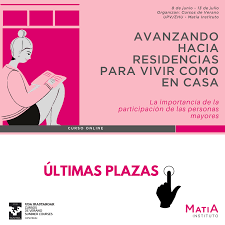Moving towards homes for living at home. The importance of older people's participation
Formación
Online course
Moving towards residences for home-like living. The importance of older people's participation. 08.jun - 13.jul
In successive reports and documents on the needs and preferences of older people, the desire to grow old at home, even in the case of needing support for daily life, is constantly being highlighted. On the other hand, for some years now, the progressive relevance of a rights-based approach in services and programmes aimed at people who have a need for support or help, whether or not linked to age, has become increasingly evident. Lastly, in recent years, sufficient evidence has been generated in relation to the design of residential environments for the elderly, both in terms of physical-architectural aspects and those referring to the social environment.
In this sense, the development of ACP in residential centres entails the implementation of interventions that promote participation, control over one's own life and decision-making. In other words, to provide an environment for meaningful, or home-like, living.
All this highlights the need to move towards gerontological centres where "life at home" is possible; moving away from the medical-care model towards one that integrates people's rights, needs and preferences, especially when they need help in their daily lives. Some experts have described this process as a "cultural change", in which all social agents are involved, among which we must not forget those who are most affected: the people who are ageing.
This online course will address the keys to generating residential environments that promote home environments in which people have options to develop their life projects. It will also present some strategies to promote personalised care and meaningful living in residential settings. Finally, the importance of the involvement of ageing people as active protagonists in the achievement of a care model adjusted to their preferences, rights and needs will be addressed.
Objectives
- To raise awareness of perspectives of care in residential settings in line with people's rights and preferences.
- To provide information on successful initiatives that combine the provision of support in residential care homes and options for the development of a life at home.
- To contribute to the dissemination and diffusion of new models of residential care, as an alternative to the traditional ones.

